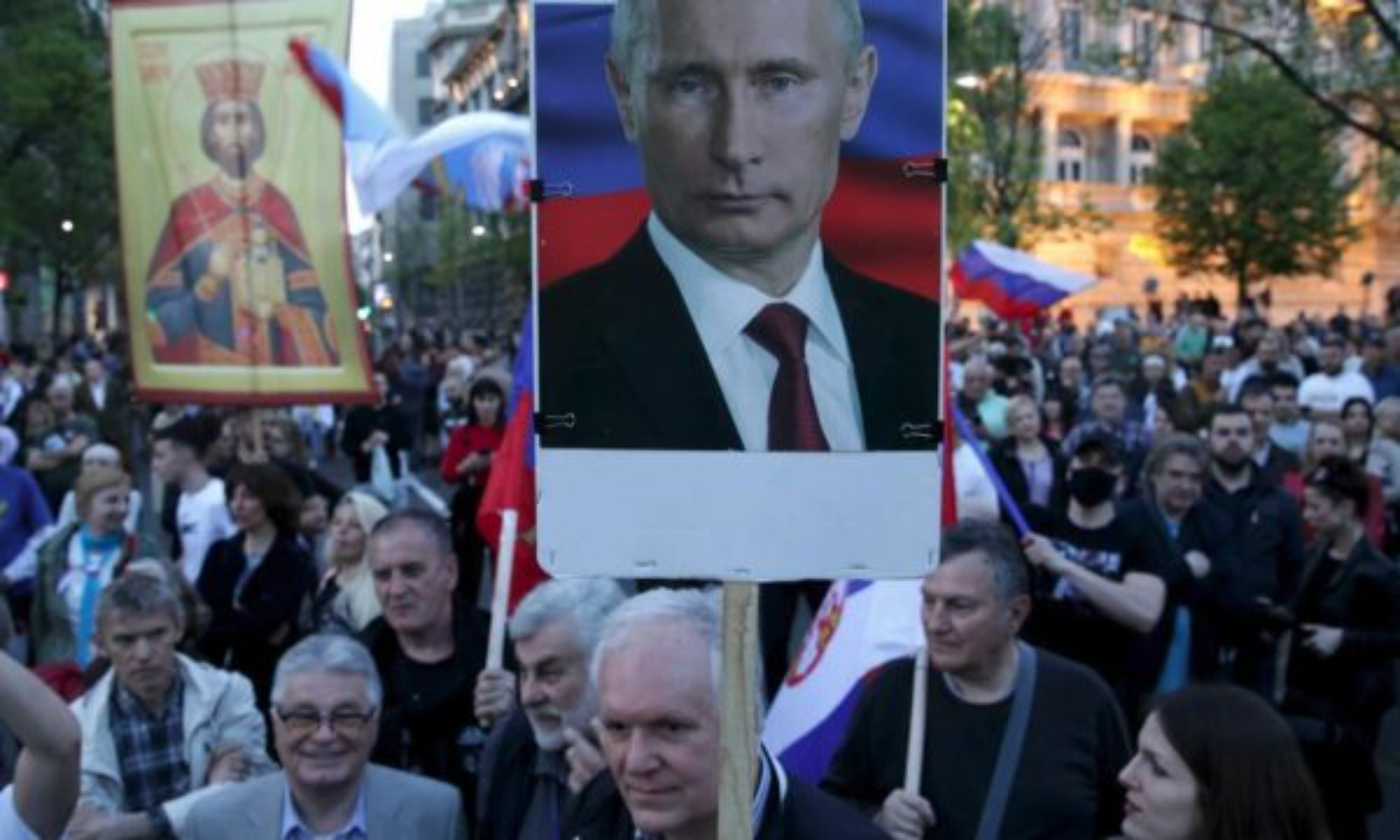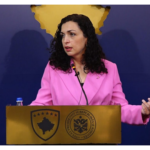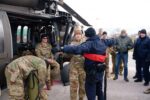The regime of Aleksandar Vučić continues to be closely connected with China and Russia. This regime also cites the positions of Russia and China, as well as other countries, regarding the status of Kosovo as a reason for non-compliance with the declarations and measures of the EU. Even the Serbian world is an idea created after the Russian world. Radar brings a text where it shows how Vucic is destabilizing the region with his actions. Kosovo is mentioned in most of the paragraphs.
Given the fact that Serbia’s full membership in the EU, at least formally, remains a strategic goal of the government, as well as a large part of the opposition, Serbia’s political program for the 21st century does not deal with aspects of important aspects of the membership negotiations, such as the rule of law and the fulfillment of the Copenhagen criteria, without which there can be no membership in the EU.
In this document, the technical aspects of membership negotiations are also not dealt with, but only with the political framework related to foreign policy (Chapter 31) and Kosovo (Chapter 35).
Since the start of the war in Ukraine, Serbia, along with Belarus, remains the only country in Europe that refuses to impose sanctions on Russia. On the other hand, Serbia exports artillery and other categories of ammunition to Ukraine.
The first decision coincides with the mood of the Serbian public, which in polls is mostly against the imposition of sanctions, but also contributes to maintaining the existing relations of the current regime with Russia.
Serbia’s refusal to comply with the EU’s foreign and security policy does not only refer to the previous sanctions packages presented against the Russian Federation. Serbia avoided accepting statements and measures directed against the People’s Republic of China, its citizens, subjects or interests.
Out of a total of 65 declarations that the EU called on candidates, potential candidates and partner countries to agree to in 2023, Serbia accepted only 34, of which 13 refer to the war in Ukraine, seven to Iran, four to global sanctions the EU regime on human rights and with other statements related to Belarus, Mali, Moldova, Syria and one on terrorism. Compared to other candidate countries for EU membership, Albania, Montenegro and North Macedonia have fully harmonized their foreign and security policy with the EU, while this is not the case with Bosnia and Herzegovina, as well as with Serbia.
The regime of Aleksandar Vučić cites the positions of Russia and China, as well as other countries, regarding the status of Kosovo as a reason for non-compliance with EU declarations and measures, but it can be assumed that the reasons for non-compliance are broader and the fact that, as the latest 2021 survey showed, voters of ruling parties are much friendlier to Russia and China than voters of much of the opposition.
While this type of balancing policy has so far borne fruit with the US and some EU member states, the fact remains that the inconsistency with the EU’s foreign and security policy represents a formal obstacle not only to the further progress of Serbia towards EU membership, but also for more tangible advantages on the way to membership, such as the EU Growth Plan for the Western Balkans, but also other financial incentives and other benefits, normally reserved for member countries, of which will be offered to Serbia and other candidate countries in the process of membership negotiations.
The political cost of non-compliance, mainly with EU sanctions against Russia, is greater in the long term than the loss of financial incentives, because Serbia is already seen in many European countries as Putin’s Trojan horse.
Only in the period 2000-2012, Serbia somehow managed to free itself from the negative burden of the past created during the 1990s, thanks to the policies of the current regime, there is a risk that Serbia will begin to be perceived in many circles as a destabilizing actor, which has consequences direct negative effects on the EU membership process, as well as weakens Serbia’s position in the negotiations for the normalization of relations with Pristina, and generally in relations with other countries of the Western Balkan region.
The constant repetition of the representatives of the official Belgrade with their interlocutors from the EU, that Serbia should not harmonize with the foreign and security policy of the EU before accepting the membership, was not received in the capitals of the EU countries. as a convincing argument, but merely as an excuse.
“We must not overlook the fact that just as the domestic policy of a country determines its foreign policy, if not more strongly, the foreign policy, i.e. related formal and informal alliances can shape a country’s domestic politics. For example, Serbia’s policy of cooperation with the Putin regime, as seen in security cooperation (eg measures against the Russian community in Serbia, etc.), contributes to Serbia’s further democratic decline. How the ruling elite in Serbia relates to external powers and alliances determines the nature of domestic political life in Serbia. For small states like Serbia, an alliance with autocratic regimes from outside is incompatible with maintaining a democratic system inside,” writes Radar.
In 2024, the prevailing interpretation is that the bombings of 1999 conditioned the future relations between Serbia and the NATO alliance and that due to the casualties of the war, the loss of sovereignty in Kosovo that followed, Serbia’s entry into the North Atlantic Alliance is impossible .
Serbia’s membership in NATO is indeed a taboo in Serbian public opinion. In the last ten years, if not longer, Serbia’s NATO membership barely supports 10 percent of the population. Interestingly, in the years immediately following the bombings, this support, according to research by the BCBP (then the Center for Civil-Military Relations), was almost three times greater. Support for NATO membership begins to decline after Kosovo’s unilateral declaration of independence in 2008. In the same period, the then Serbian authorities defined a new foreign policy of Serbia based on the idea of ”four pillars”: the EU, the US , Russia and China. The assessment of the then state leadership was that this foreign policy orientation reflects the real balance of power in the world. In the geopolitical circumstances of that time, the state leadership assessed that strategic partnerships with the USA, Russia and China did not prevent the achievement of the main task, which is Serbia’s membership in the EU. The situation is significantly different after Russia’s attack on Ukraine on February 24, 2022
Serbia’s military neutrality is primarily a political decision that expresses the position that the country is not interested in joining existing military alliances. Serbia adopted the Resolution for the Protection of the Sovereignty, Territorial Integrity and Constitutional Order of the Republic of Serbia in 2007, which established its military neutrality. Military neutrality is also mentioned in the National Security and Defense strategies approved in August 2019. Despite this, in June 2023, Serbia sent soldiers to the international peacekeeping operation in the Sinai Peninsula. This mission, “Multinational Forces and Observers”, represents the first military mission in which the Armed Forces of Serbia participate, which is not under the auspices of the EU or the UN, in which the Forces of Serbian armed forces as part of the American contingent. .
Out of a total of 65 EU declarations during 2023, Serbia has agreed to only 34, of which 13 refer to the war in Ukraine, seven to Iran, four to the EU global sanctions regime for human rights and other statements regarding Belarus, Mali. , Moldova, Syria and one on terrorism.
Despite the fact that Serbian public opinion is extremely negatively oriented towards the idea of NATO membership, Serbia is surrounded by the countries of the North Atlantic Alliance. Out of a total of nine neighbors (if the territory of Kosovo is included), seven are members of the military alliance and the majority of the population in BiH and Kosovo aspires to membership. Regardless of the obligation to respect the will of the voters, the responsibility of the government in representative democracies, such as Serbia, is to fight for the interests of the citizens and in this sense take political responsibility and propose solutions that often conflict with the majority. the point of view of public opinion. In this sense, it is necessary to imagine scenarios that, in the current geopolitical conditions of increasingly frequent world conflicts, would offer the citizens of Serbia a safe and prosperous life in the best possible way. History provides an example where the SFRY, through its participation in the Balkan Pact in 1953, a military alliance consisting of communist Yugoslavia and two capitalist NATO member countries (Turkey and Greece), managed to overcome ideological differences with its partners. in the Balkan Pact. to resist the threat that at that historical moment was represented by the Soviet Union.
Given the current developments in the world, as well as the disposition of internal public opinion in Serbia towards NATO membership, the best response to the security challenges in the Western Balkans region would be security cooperation between all the countries of the Western Balkans. regardless of whether or not they are NATO members within the Berlin process. In this way, Serbia, without the obligation to join NATO, would join the common European security umbrella, through cooperation with other countries in the region. On the other hand, neighboring countries in the Western Balkans will be provided with additional guarantees for peaceful coexistence and cooperation with Serbia.
The idea of the “Serbian world” first appears as a political term around 2020 and soon continues to circulate through occasional statements by exponents of the ruling regime in Serbia, Republika Srpska and part of the political scene in Montenegro.
It is analogous to similar expressions that appear in other nations, more similar to the idea of the Russian world. The Serbian world in the broadest sense includes the idea of strengthening the cohesion of the Serbian people in the former Yugoslav republics where they live, but often also includes ideas advocating the political integration of areas with an ethnic Serb majority (Republic of Serbia, Republika Srpska and Mali i Black) in a federal state community.
Critics of the idea, mainly from the region, interpret the idea of the “Serbian world” as the ideology of Greater Serbia adapted to the new times, in other words, the renewal of the irredentist aspirations of the Serbian state towards their countries.
The US and the EU also view any additional redrawing of borders in the Balkans extremely negatively and under the current circumstances would prevent it at all costs.
While the official regime in Belgrade, in order to maintain good relations with its EU and US partners, mostly refrains from direct public calls for the unification of Serbia and Republika Srpska, political representatives of Serbs in Bosnia and Herzegovina often do so. .
That the calls for unification coming from the Republika Srpska still remain on the political margins are also shown by the answers from the Serbian political subjects from Montenegro, who emphasize that the best framework in which all Serbs will live again in the same state is European union.
Regardless of the political rhetoric, the impression is created that the majority of political subjects in Serbia, Republika Srpska and Montenegro are clear that the current international circumstances do not allow further border changes in the Balkans and that the possible implementation of such a policy would lead to new conflicts.
Aware that the populist idea of a “Serbian world” serves only to fulfill the cheap daily political interests of the current regime and in the long run harms the national interest of Serbia in the region, the new democratic government in Serbia must refuse. him without any hesitation and without hesitation.
In order to properly advocate for the protection of the rights of the Serbian minority in the region, Serbia must become a political pivot that, through a joint political initiative of other countries, leads the Western Balkans towards full membership in the EU. To achieve this goal, Belgrade needs to strengthen its political capital in other capitals of the Western Balkans, and this goal cannot be achieved simply by dressing up the defeated political ideologies of the last century.
“Serbia must be an actor that will create a new Balkan initiative, strengthen the bloc of candidate countries for EU membership in the region and make it able and willing to speak with one voice in Brussels and in the capitals other European. It is impossible to simply ignore Serbia and proceed with the European integration of the rest of the region without it. Serbia has the political and economic weight, without which it is impossible to create a stable Bosnia and Herzegovina, a multi-ethnic Kosovo and without which the entire Balkans will not be able to be pacified or integrated into the EU”, writes Radar.
Such a position requires a great responsibility of the state, which implies the decision that the calls for political unification on the ethnic principle coming from some Serbian leaders in the region are not in the national interest of Serbia, that they should remain in politics. margin, that just as Montenegro rejects them, regardless of whether it is in power or opposition, Serbia should also reject them and in the governing structures and in society in general, the policy should be established that the European Union is not only geopolitical. and identity gravitational necessity for Serbia, but also the best political framework in which all Serbs will once again live in the same country. The strongest economic country in the region, namely Serbia, will benefit the most from the most intensive economic and political cooperation (within the Berlin Process and the Common Regional Market).
Changing the conditional paradigm within the country, which is being forced by the current regimes in Belgrade and Banja Luka, represents the only way out and is a prerequisite for the fulfillment of Serbian national interests. If Serbia does not position itself in this way, it will lose everything and drag the rest of the region with it into the political and historical abyss.







